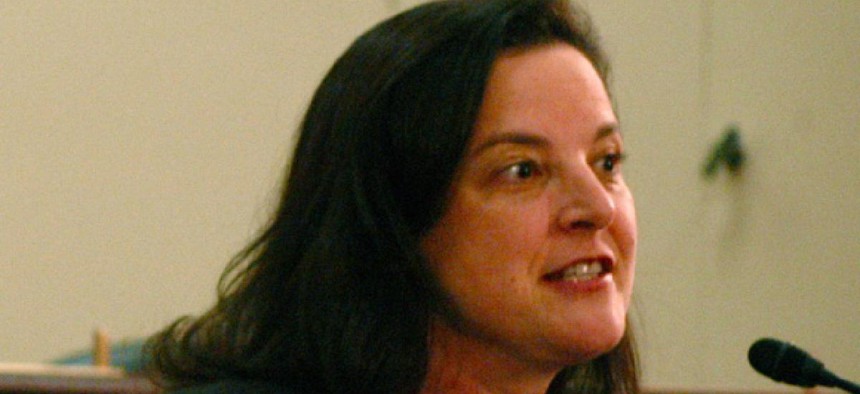
OSC's Carolyn Lerner. Flickr user govtoversight
Lawmakers urged to bring Hatch Act into the age of telework and social media
Legislation revising the law prohibiting feds from certain political activities doesn’t address technological advances.
Congress should address technology and social media in current legislation that reforms the law restricting government employees from certain political activities, a panel of witnesses told House lawmakers Wednesday.
Legislation circulating in the House and Senate would update the 1939 Hatch Act, which prohibits federal, state and local government employees from running for office in partisan elections or engaging in political activity while on duty or in a government office. The bills under consideration include a broader range of penalties for federal workers who violate the law, ensuring they do not automatically lose their jobs; the legislation also would allow state and local government employees to run for partisan political office.
But none of the bipartisan bills in their current form defines what constitutes the federal workplace in the age of telework and social media, witnesses pointed out. Special Counsel Carolyn Lerner, whose office enforces the Hatch Act, said Congress should consider clarifying that prohibited political activity under the law applies to employees while they are teleworking, as well as address the prevalence of laptops, BlackBerrys and iPhones throughout government. “The Internet and social media have dramatically changed the way we gather and share information, communicate our views, or engage in the political process,” Lerner told a House Oversight and Government Reform subcommittee. “These changes were not contemplated when the Hatch Act was last amended to restrict political activity on duty or in the federal workplace.” The Office of Special Counsel has issued guidance on the use of social media and the Hatch Act.
Scott Coffina, a former official during the Reagan and George W. Bush administrations, agreed that lawmakers should take the opportunity to address the major technological advances that have occurred since the Hatch Act was last revised in 1993. “Useful amendments to the Hatch Act ought to account for the ease with which government employees can communicate with each other on political matters without the use of government resources and with minimal disruption to the work day,” said Coffina, who now works at law firm Drinker Biddle.
He noted the prevalence of smartphones “creates a real obstacle to enforcing the Hatch Act prohibition on federal employees participating in political activity in the workplace, which literally requires employees to leave the building to make a phone call or send an email for a partisan political cause. However, the ease with which the employees can dash off a ‘political’ email from their own personal smartphones [not using government resources] makes the time to go outside seem wasteful and enforcement of this restriction quite impractical.”
Lerner said Congress also might consider whether emailing on a dot-gov email domain to engage in political activity, even while the employee is off duty, is consistent with the goals of the Hatch Act.
Many have criticized the Hatch Act as confusing, ambiguous and overly restrictive. For instance, the law in its current form has resulted in cases such as a Pennsylvania police officer in a K-9 unit who was told he couldn’t run for his local school board because he received some funds from the Homeland Security Department for his dog. And in many circumstances, a deputy sheriff who wants to run for sheriff is ineligible to do so, Lerner noted. Also, federal, state and local employees are allowed to run in nonpartisan elections, making enforcement of the law inconsistent and dependent on a locality’s rules regarding what’s partisan and nonpartisan.
Lerner said allowing state and local employees to run for partisan political office “will promote good government, demonstrate respect for the independence of states and localities, and allow OSC to better allocate its scarce resources toward more effective enforcement of the Hatch Act. This expansive application of the law leads to absurd results and does nothing to advance the law’s purpose or the public interest.”
Those state and local employees still would be subject to the law’s prohibitions on misuse of official authority and coercive conduct, she noted.
Lerner has made reforming the Hatch Act a top priority since her arrival at OSC nearly a year ago. More than 45 percent of OSC’s overall Hatch Act caseload, including more than 500 investigations during the past two years, involved state and local campaign cases that did not involve any allegation of coercive or abusive political conduct, she said.
During Wednesday’s hearing, Rep. Elijah Cummings, D-Md., sponsor of a bill reforming the Hatch Act, said he expected to schedule a committee markup for May 31. The Senate Homeland Security and Governmental Affairs Committee postponed its Hatch Act reform bill markup scheduled for Wednesday.







